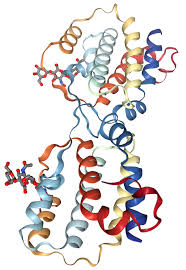Interleukin-34 (IL-34) is a cytokine that has garnered significant attention in recent years due to its intriguing role in immune regulation. In this blog post, we delve into the fascinating world of IL-34, exploring its functions, implications in health and disease, and the latest research insights.Understanding Interleukin-34IL-34 is a cytokine that binds to the colony-stimulating factor-1 receptor (CSF-1R), playing a crucial role in the development and function of macrophages and other myeloid cells. Unlike colony-stimulating factor-1 (CSF-1), IL-34 operates through a distinct pathway, adding complexity to immune system modulation.Functions and EffectsResearch indicates that IL-34 contributes to various physiological processes, including:
Macrophage Differentiation: IL-34 promotes the differentiation of monocytes into macrophages, influencing tissue homeostasis and immune responses.Microglial Activation: In the central nervous system, IL-34 is involved in microglial activation and neuroinflammation, highlighting its role beyond traditional immune functions.Bone Metabolism: IL-34 regulates osteoclast differentiation and bone remodeling, linking it to skeletal health and diseases like osteoporosis.Skin Homeostasis: Studies suggest IL-34’s involvement in skin physiology, influencing the behavior of dermal macrophages and skin immune responses.Implications in Health and DiseaseThe multifaceted functions of IL-34 have significant implications in various health conditions and diseases:
Inflammatory Disorders: Dysregulated IL-34 expression is associated with inflammatory diseases such as rheumatoid arthritis, inflammatory bowel disease, and psoriasis.Neurological Conditions: IL-34’s role in microglial activation has implications for neurodegenerative disorders like Alzheimer’s disease and multiple sclerosis.Cancer Biology: Emerging research explores IL-34’s impact on tumor-associated macrophages and its potential as a therapeutic target in cancer immunotherapy.Latest Research and Future DirectionsRecent studies continue to unravel the complexities of IL-34 biology, offering insights into its therapeutic potential and clinical applications. Future research directions include:
Targeted Therapies: Investigating IL-34 inhibitors and agonists for targeted immune modulation in inflammatory diseases and cancer.Diagnostic Biomarker: Exploring IL-34 as a diagnostic biomarker for assessing disease severity and treatment response in immune-related disorders.Tissue-Specific Effects: Understanding IL-34’s tissue-specific effects and signaling pathways for tailored therapeutic interventions.ConclusionInterleukin-34’s intricate involvement in immune regulation, tissue homeostasis, and disease pathogenesis underscores its significance as a promising target in biomedical research and clinical medicine. As our understanding deepens, IL-34 holds potential for innovative therapies and diagnostic strategies, paving the way for advancements in immunology and personalized medicine.


